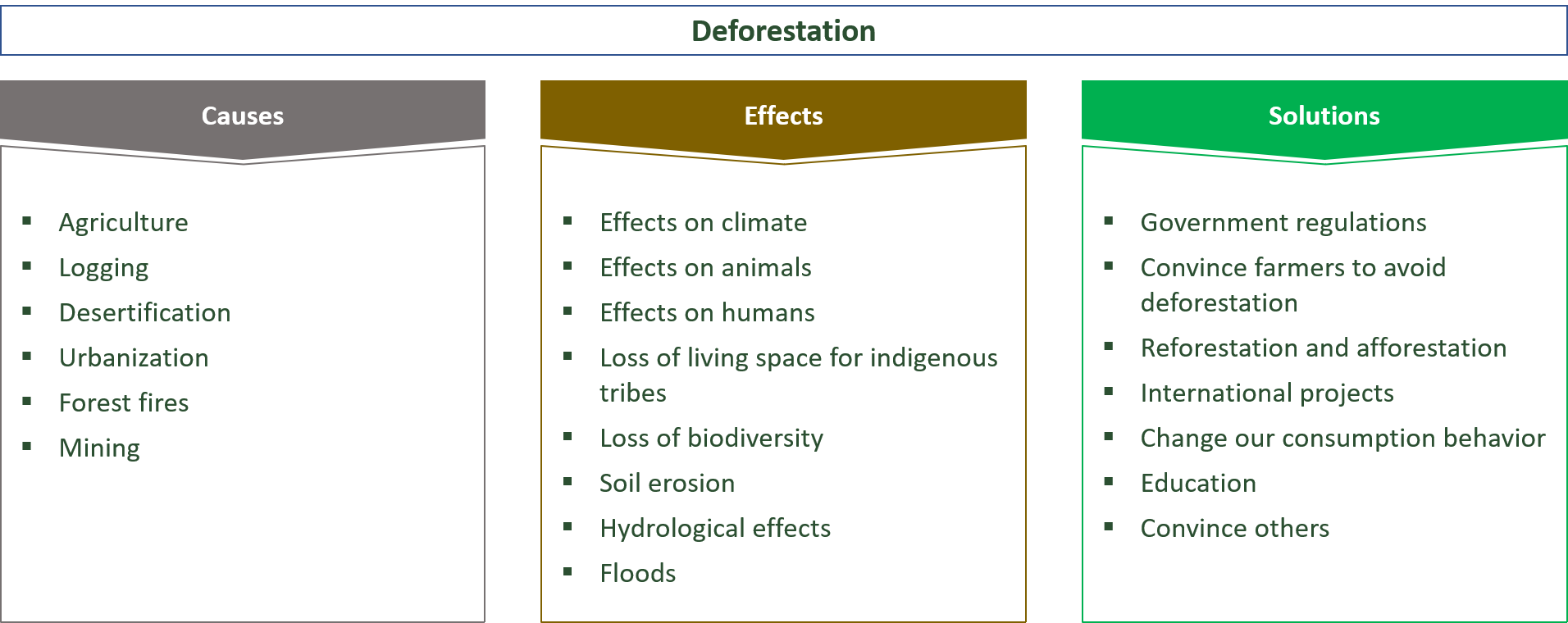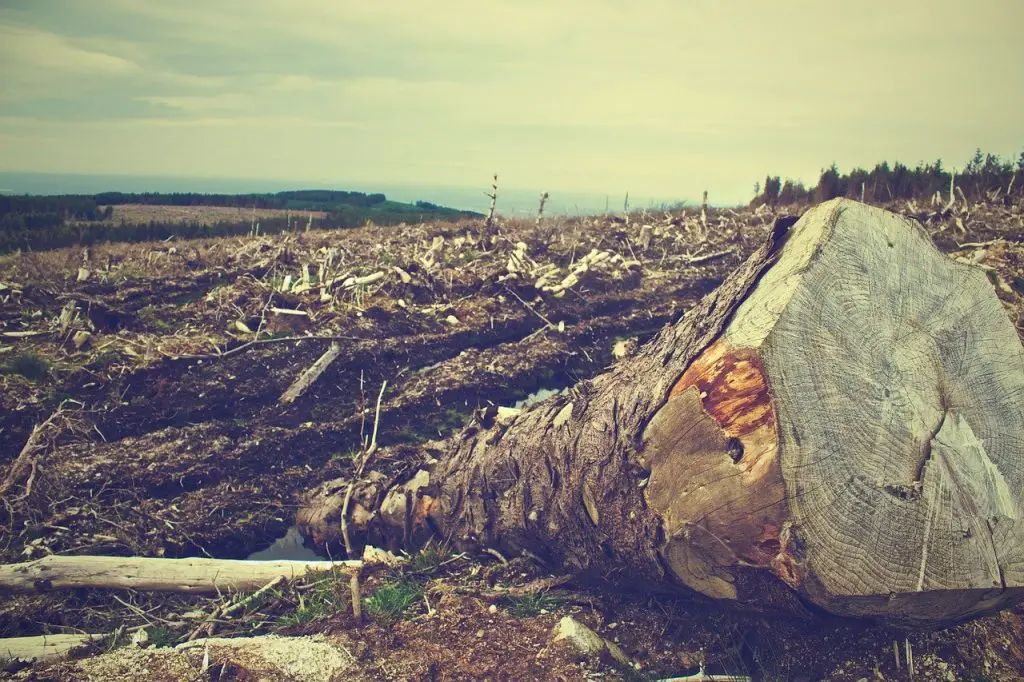“Burn the forests if you will, but you will only scorch your own lungs.”
Anthony T. Hincks
Deforestation: Causes, Effects & Solutions

Deforestation can be defined as the removal of a forest with the purpose of converting this land into non-forest use.
After deforestation, the land can now be used for ranches, farms or also for urban purposes.
There are several harmful effects of deforestation on the environmental system.
For example, deforestation can cause a loss in biodiversity and can also indirectly contribute to the global warming problem.
Thus, it is crucial to preserve our forests, especially the rainforest.
In the following, the causes, effects as well as solutions to the deforestation problem will be examined.
Audio Lesson
Contents
Causes for Deforestation
- Agriculture
- Logging
- Desertification
- Urbanization
- Forest fires
- Mining
Agriculture
One of the main reasons for deforestation is the worldwide increasing demand for meat and plants.
According to the UNFCCC, subsistence farming accounts for 48% of deforestation and commercial agriculture is responsible for 32%.
Farmers will often be able to earn much more by cutting down the trees and transforming the land into farmland than by conserving the forest.
Thus, farmers will even be tempted to burn down the forest in order to be able to monetize it.
This problem is especially prevalent in the rainforest.
Each year, there are several wildfires caused by humans who want to have more land for farming activities.
Logging
Logging is another big reason for deforestation.
We need wood for many different purposes in our daily lives.
Among others, it is used for the production of paper, furniture, firewood or also for the production of charcoal.
Thus, in order to meet this demand, it is profitable for landowners to cut down substantial amounts of their forest.
Desertification
Many parts of land are used for industrial purposes.
These industries often do not care too much about the environment and dump their chemical by-products in rivers and forests which in turn can lead to the contamination and desertification of land.
Due to the desertification, this land will not be suitable to plant new trees anymore.
Urbanization
Due to population growth, more and more space is needed for the building of houses and the related infrastructure.
This also includes the construction of roads.
Thus, deforestation is one way to create more settlement space.
Forest Fires
Forest fires can be caused by either human activities or also by nature.
Forest fires can be a huge problem, especially in warm and dry periods of the year.
Large areas of forest and even lives can be lost due to uncontrolled wildfires.
Mining
Another reason for deforestation is the use of coal and oil mines.
Exploiting these natural resources can be very profitable.
However, in order to do this, large forest areas have to be cut down.
Moreover, the chemicals used for the extraction of the resources are often dumped into nature which results in contamination of large parts of the ecosystem.

Effects of Deforestation
- Effects on climate
- Effects on animals
- Effects on humans
- Loss of living space for indigenous tribes
- Loss of biodiversity
- Soil erosion
- Hydrological effects
- Floods
Effects on climate
Deforestation is a severe cause of global warming since, after fossil fuel combustion, it is the second-largest anthropogenic source of carbon dioxide.
Carbon dioxide is produced in the burning of forest biomass and by the decomposition of plant material.
Forests are also a natural carbon sink.
Through photosynthesis, plants convert the carbon into sugar and oxygen.
The carbon is also stored in plants and trees.
Thus, burning these trees results in a release of carbon dioxide which in turn contributes to the global warming problem.
Effects on animals
Deforestation has a significant adverse effect on animals since animals lose their natural habitat.
They either have to move in order to find a new home or they will die since they lose their food sources.
Thus, in the worst case, deforestation can even lead to the extinction of certain animals.
Effects on humans
Humans are also affected by deforestation in several ways.
While there is an economical upside from deforestation for a small group of farmers, the majority of the world’s population will suffer due to the climate change issue.
Loss of living space for indigenous tribes
There are some areas on our planet where people are still living in peace with their natural environment.
Especially in the Amazon Rainforest, there are several tribes that still live a quite original life without our western amenities.
These people rely on an intact environmental system since they still make their living from fishing or other nature-related activities.
However, as our greed for more land for housing and infrastructure purposes continues, more and more areas that had previously been used by indigenous people are now used for farming or industrial purposes.
This means that large areas of land are cut or burned down in order to get more land for farming purposes to make more money.
This also implies that the natural living space for the tribes is destroyed and that they may also lose their home.
Thus, deforestation can adversely impact the living conditions of many people.
Loss of biodiversity
Deforestation leads to vast decline in biodiversity.
It also causes the extinction of many species. Forests provide habitats for wildlife and also foster medicinal conservation.
About 80% of the world’s biodiversity is located in tropical rainforests.
This number shows the importance of the forest as medium to preserve the huge variety of species.
It was also found in a study that deforestation also destroys the microbial community which is responsible for the production of clean water, the removal of pollutants and for the recycling of nutrients.
A study of the Brazilian Amazon predicts that up to 90 percent of predicted extinctions will occur until the next 40 years.
Soil erosion
Soil erosion can be another effect of deforestation.
Forests protect the soil from the sun and keep it moist.
By removing the trees, the soil is no longer protected and will dry out, which in turn can lead to soil erosion.
Hydrological effects
Deforestation also affects the water cycle.
Through their roots, trees extract groundwater and release it into the atmosphere.
The removal of trees thus contributes to a drier climate since it reduces the concentration of atmospheric moisture.
Floods
Trees are a natural storage of water.
They hold back large amounts of rainwater with their roots.
When the trees are removed, this natural water storage is gone and thus the vulnerability for floods increases dramatically.

Solutions to the Deforestation Problem
- Government regulations
- Convince farmers to avoid deforestation
- Reforestation and afforestation
- International projects
- Change our consumption behavior
- Education
- Convince others
Government regulations
In order to protect the forests, there have to be strict regulations on how much forest is allowed to be cut down and how much has to be preserved.
It is too tempting to cut down the forest and transform it to farmland.
Without regulation, the deforestation process will continue until there is not much forest left.
Convince farmers to avoid deforestation
Farmers have to be convinced of the huge negative effects of deforestation on humanity.
Since farmers have a financial incentive for turning their forests into farmland, it should also be considered to subsidize them in a way that they have a financial incentive to protect their forests.
Reforestation and afforestation
Reforestation can be defined as the restocking of existing forests and woodlands that have been depleted, afforestation refers to the planting of trees in areas where there has been no tree cover before.
Thus, either through reforestation or afforestation, another measure to meet the deforestation problem is to plant new trees.
However, it takes a quite long time until the trees have a significant size and impact on the climate.
International projects
There are several foundations that relate to the problem of deforestation and try to find solutions.
Founded in 1972, the Arbor Day Foundation is the largest nonprofit organization dedicated to the planting of trees.
The Billion Tree Campaign launched in 2006 also has the goal to plant as many trees as possible.
As of 2011, more than 12 billion trees have been planted due to the efforts of this organization.
At the end of 2017, the campaign was renamed in “Trillion tree campaign“.
Moreover, there is a project called the Amazon Fund which has the goal to raise money in order to monitor, combat and prevent deforestation.
Change our consumption behavior
Since the industrial revolution period, it is possible for humans to have high consumption levels which have never been possible before in the history of mankind.
Due to production with the support of machines, we are able to produce large quantities of goods with a low unit price.
This seems to be a good thing, but also has severe downsides.
One of them is that in order to be able to meet the increasing demand for material goods, more resources have to be extracted.
Moreover, more farming has to be done in order to meet the increasing demand for meat.
To provide all those resources, large areas of forests had been cut down.
This problem is especially severe in the Amazon Rainforest where farmers often start wildfires intentionally since they want to get more land for farming purposes since it is more profitable for them.
Therefore, to be able to stop the problem of deforestation, we have to change our consumption behavior.
For instance, this could mean not always buying the newest shit but rather keeping things that are still functional.
It could also mean to reduce meat consumption.
Thus, we can contribute in many different ways in our daily life behavior in order to mitigate the issue of deforestation.
Education
Education is another crucial measure against deforestation and its implied problems for our earth.
Many people in our nowadays society do not know how important our forests really are for our planet and therefore also for the living quality of their children.
We have to make clear that forests are a vital part of the environment and that we have no chance to fight global warming if we continue to cut down large forest areas.
This education should start pretty early. It should already be taught in elementary school that we need our forests to survive as a species.
This education will likely have even more positive effects.
Since these educated children will tell their parents about the adverse consequences of deforestation and how we can prevent it, parents are more likely to also pay more attention to their daily behavior.
Moreover, when the educated children turn into grownups, they are more likely to behave in an environmentally friendly manner than children without this education.
Convince others
As we have already seen, there are several measures that we can take in our daily life in order to prevent deforestation and the implied adverse consequences on the environmental system.
However, our contribution is only one part of the equation.
For really making an impact that matters, we have to convince our family, friends or also as many people as possible about the importance of saving our forests from deforestation.
If we are able to convince many people, these people will also convince other people, and so on.
In this way, we are able to make a huge impact on our society and will make a real contribution in order to mitigate the deforestation issue.
Conclusion
Deforestation is a big problem for humans and also for the whole ecosystem.
While it is quite profitable for certain small groups like farmers, deforestation is extremely harmful to the planet since it enhances global warming and also leads to the extinction of many species.
It also increases the likelihood of floods and other natural disasters.
Thus, we should make sure to stop the deforestation process on a global scale.
Famers should be encouraged to preserve their forests.
Governments have to strictly regulate the amount of deforestation to make sure that enough woodland remains untouched.
In conjunction with the other measures mentioned before, planting trees can be a supplementary measure to meet the deforestation problem.
Sources
https://www.redorbit.com/news/science/1112753888/amazon-deforestation-microbial-communities-122512/
http://www.rain-tree.com/facts.htm

About the author
My name is Andreas and my mission is to educate people of all ages about our environmental problems and how everyone can make a contribution to mitigate these issues.
As I went to university and got my Master’s degree in Economics, I did plenty of research in the field of Development Economics.
After finishing university, I traveled around the world. From this time on, I wanted to make a contribution to ensure a livable future for the next generations in every part of our beautiful planet.
Wanna make a contribution to save our environment? Share it!